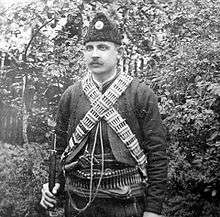Lazar Kujundžić
Lazar Kujundžić-Klempa (Serbian Cyrillic: Лазар Кујунџић: 1880 – May 25, 1905) was a Serbian Chetnik commander (vojvoda) who was active in Old Serbia and Macedonia.
Lazar Kujundžić | |
|---|---|
 Lazar Kujundžić, 1904–05 | |
| Nickname(s) |
|
| Born | 1880 Orahovac, Kosovo Vilayet |
| Died | May 25, 1905 (25 years) Velika Hoča, Kosovo Vilayet |
| Allegiance |
|
| Years of service | 1903–05 |
| Battles/wars | Serbian operation in Macedonia |
Biography
He was born in Orahovac, near Prizren. He graduated from a teacher's college at the Orthodox seminary in Prizren. He was a teacher in Prizren and Kičevo. He wrote a report with data about the Islamization of Christian women and girls in the Kičevo region. Ever since 1902, he has been an advocate for the creation of a Serbian Chetnik Organization that would protect the Serb population of Poreč from being attacked by a VMRO company and Muslim looting gangs. After the Ilinden uprising, he took up the job of organizing the first Serbian troops and revolutionary committees. The money for the first company was given to him by the painter Nadežda Petrović, who in 1903 visited the devastated areas carrying humanitarian aid. On that occasion, Kujundžić met with Savatije Milošević and Vojislav Tankosić.
He participated in the Fight on Čelopek when the Chetniks destroyed the Turkish forces. After the fight, he did not want to flee into Serbia but continued to operate in Ottoman-occupied Old Serbia with commanders Savatije Milošević and Živojin Milovanović. On the Feast of the Ascension, his band appeared in Velika Hoča. They were received by Albanian Lanja Ukin who had given them his word (besa) that nothing would happen to them in his house, however, he immediately alarmed the Turks in Orahovac who surrounded them. They set the house on fire. The Chetniks shot back and sung Chetnik songs. The Turks brought Lazar's mother to recognize him for them, but she did not, in order to save her village and family.[1]
During the Interwar period, he was hailed as a great hero.
In Serbian Literature
The heroic deaths of Kujundžić and Milošević inspired Milan Rakić to write a poem "At Gazi Mestan", [2] and the stoic comportment of Lazar's mother moved Serbian Catholic Ivo Vojnović to write a play called "The Resurrection of Lazar" (Lazarevo Vaskrsenje) in 1913. Another poet and veteran Chetnik Milosav Jelić dedicated a poem to Lazar Kujunžić's mother -- Majka Kujundžića -- in his collection of poems, Srpski vijenac (Serbian Garland).[3][1]
See also
References
- Simo Živković (December 1998). "Sakupi se jedna četa mala". Srpsko-nasledje.rs. Retrieved 2011-08-12.
- https://books.google.ca/books?id=_H9pAAAAMAAJ&dq=Lazar+Kujundzic&focus=searchwithinvolume&q=Rakic%27s+poem+
- https://books.google.ca/books?id=_H9pAAAAMAAJ&q=lazar+kujundzic&dq=lazar+kujundzic&hl=en&sa=X&ved=0ahUKEwjGmIq4jpvlAhVCXqwKHQmMAlgQ6AEIKTAA
Sources
- Trbić, Vasilije (1996). Memoari: 1898-1912 (in Serbian). Kultura.
- Nikolajević, Dušan S. (June 1936). "Лазар Кујунџић". Београдске Општинске новине. 54 (6–7): 468–470.
- Ranković, Ž. J. (April 1939). "Четничка акција I". Београдске Општинске новине. 57 (4): 173–184.
- K., S. (7 June 1930). "Јуначка смрт..." Vreme. p. 2.
| Wikimedia Commons has media related to Lazar Kujundžić. |